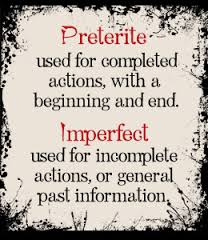Preterito vs imperfecto
 Preterito vs Imperfecto, when describing events or situations in the past, Spanish speakers must choose between the preterite and the imperfect. The choice depends on the aspect of the event or situation that the speaker wants to describe. In theory, every action has three phases or aspects; a beginning, a middle and an end. When a speaker focuses on the beginning or the end of an action, the preterite is used. When he or she focuses on the middle, the imperfect is used.
Preterito vs Imperfecto, when describing events or situations in the past, Spanish speakers must choose between the preterite and the imperfect. The choice depends on the aspect of the event or situation that the speaker wants to describe. In theory, every action has three phases or aspects; a beginning, a middle and an end. When a speaker focuses on the beginning or the end of an action, the preterite is used. When he or she focuses on the middle, the imperfect is used.
Uses of the Imperfect tense vs preterite tense is one of the greatest problems for the Spanish student.
The Imperfect tense is much less commonly used in English than in Spanish. since the word Imperfect means not perfect or not completed, the imperfect
tense in used to express continuance, to express those actions in the past which are either customary or habitual. Some common adverbial expression which would indicate continuance and thus demand the use of the imperfect are:
- Siempre: always
- Con frecuencia: frequently
- Frecuentemente: frequently
- A menudo: often
- A veces: sometimes
- De vez en cuando: sometimes, from time to time
- Muchas veces: many times
- Cada dia: every day
We use Imperfect:
- repeated action
- Habitual action
- indefinite period of time
- Setting the scene
- Weather
- Time
- Description of a scene
- ongoing/Interrupted action
- Personal description
- Age
- Emotions/ Feeling/ Beliefs
- Status of mind / Body
- Physical appearance
Uses of the Preterite tense
The preterite is often referred to as the past definite. It is used to express an action that was completed at a definite time in the past. Some common adverbial phrases that accompany the preterite are:
- Ayer: yesterday
- Anteayer: the day before yesterday
- anoche: last night
- el otro dia: the other day
- hace dos dias: two days ago
- la semana pasada: last week
- el mes pasado: last month
- durante tres siglos: for three centuries
Preterite express:
- Events
- One time event
- Chain of event in a storyline
- Actions within a defined period of time’
- isolated action
- Interrupting action